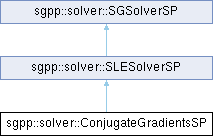#include <ConjugateGradientsSP.hpp>
|
| virtual void | calcStarting () |
| | function that signals the start of the calculation of the CG method (used in python)
|
| |
| virtual void | complete () |
| | function that signals the finish of the cg method (used in python)
|
| |
| | ConjugateGradientsSP (size_t imax, float epsilon) |
| | Std-Constructor.
|
| |
| virtual void | iterationComplete () |
| | function that signals that one iteration step of the CG method has been completed (used in python)
|
| |
| void | solve (sgpp::base::OperationMatrixSP &SystemMatrix, sgpp::base::DataVectorSP &alpha, sgpp::base::DataVectorSP &b, bool reuse=false, bool verbose=false, float max_threshold=-1.0) |
| | function that defines a solve method for an iterative solver.
|
| |
| virtual void | starting () |
| | function that signals the start of the CG method (used in python)
|
| |
| virtual | ~ConjugateGradientsSP () |
| | Std-Destructor.
|
| |
| | SLESolverSP (size_t imax, float epsilon) |
| | Std-Constructor.
|
| |
| virtual | ~SLESolverSP () |
| | Std-Destructor.
|
| |
| float | getEpsilon () |
| | gets the the epsilon, that is used in the SGSolver
|
| |
| size_t | getNumberIterations () |
| | function that returns the number of needed solve steps
|
| |
| float | getResiduum () |
| | function the returns the residuum (current or final), error of the solver
|
| |
| void | setEpsilon (float eps) |
| | resets the epsilon, that is used in the SGSolver
|
| |
| void | setMaxIterations (size_t nIterations) |
| | resets the number of maximum iterations
|
| |
| | SGSolverSP (size_t nMaximumIterations, float epsilon) |
| | Std-Constructor.
|
| |
| virtual | ~SGSolverSP () |
| | Std-Destructor.
|
| |
|
| float | myEpsilon |
| | epsilon needed in the, e.g. final error in the iterative solver, or a timestep
|
| |
| size_t | nIterations |
| | Number of Iterations needed for the solve.
|
| |
| size_t | nMaxIterations |
| | Number of maximum iterations for cg.
|
| |
| float | residuum |
| | residuum
|
| |
◆ ConjugateGradientsSP()
| sgpp::solver::ConjugateGradientsSP::ConjugateGradientsSP |
( |
size_t |
imax, |
|
|
float |
epsilon |
|
) |
| |
◆ ~ConjugateGradientsSP()
| sgpp::solver::ConjugateGradientsSP::~ConjugateGradientsSP |
( |
| ) |
|
|
virtual |
◆ calcStarting()
| void sgpp::solver::ConjugateGradientsSP::calcStarting |
( |
| ) |
|
|
virtual |
function that signals the start of the calculation of the CG method (used in python)
◆ complete()
| void sgpp::solver::ConjugateGradientsSP::complete |
( |
| ) |
|
|
virtual |
function that signals the finish of the cg method (used in python)
◆ iterationComplete()
| void sgpp::solver::ConjugateGradientsSP::iterationComplete |
( |
| ) |
|
|
virtual |
function that signals that one iteration step of the CG method has been completed (used in python)
◆ solve()
function that defines a solve method for an iterative solver.
In contrast to the normal solve routine this method operates on sinlge precision data.
- Parameters
-
| SystemMatrix | reference to an sgpp::base::OperationMatrix Object that implements the matrix vector multiplication |
| alpha | the sparse grid's coefficients which have to be determined |
| b | the right hand side of the system of linear equations |
| reuse | identifies if the alphas, stored in alpha at calling time, should be reused |
| verbose | prints information during execution of the solver |
| max_threshold | additional abort criteria for solver |
Implements sgpp::solver::SLESolverSP.
References sgpp::base::DataVectorSP::add(), alpha, sgpp::base::DataVector::axpy(), sgpp::base::DataVectorSP::dotProduct(), sgpp::base::DataVector::getSize(), sgpp::base::OperationMatrixSP::mult(), sgpp::base::DataVectorSP::mult(), sgpp::solver::SGSolverSP::myEpsilon, sgpp::solver::SGSolverSP::nIterations, sgpp::solver::SGSolverSP::nMaxIterations, sgpp::solver::SGSolverSP::residuum, sgpp::base::DataVector::setAll(), and sgpp::base::DataVectorSP::setAll().
◆ starting()
| void sgpp::solver::ConjugateGradientsSP::starting |
( |
| ) |
|
|
virtual |
function that signals the start of the CG method (used in python)
The documentation for this class was generated from the following files:



 Public Member Functions inherited from sgpp::solver::SLESolverSP
Public Member Functions inherited from sgpp::solver::SLESolverSP Public Member Functions inherited from sgpp::solver::SGSolverSP
Public Member Functions inherited from sgpp::solver::SGSolverSP Protected Attributes inherited from sgpp::solver::SGSolverSP
Protected Attributes inherited from sgpp::solver::SGSolverSP